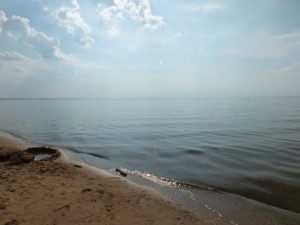Poets and writers of fiction and nonfiction write with a sense of specific place in all languages. Once place is introduced in the piece, emotions are evoked, and a lot of things can happen in that place. In poetry, place provides an outer structure and a vehicle to contain and carry a poem into memory, reflection and ideas. Description of place not only offers knowledge of a geographical space, it allows readers into the poet’s intimate experience.

Various theories exist as to why writers use place, including that the poet may seek to write about something outside themselves. Imagination and profound feelings, as well as serious thinking are stimulated by surroundings. If the best poems grow out of a particular experience, then locating them in a literal setting allows the poet to add a balance of metaphorical or figurative devices.
The following poems, two from the nineteenth century, Dover Beach by Matthew Arnold, By the Sea by Emily Dickinson, as well as my own poem, On Goodnow Mountain, are examples of poetry about, or incorporating a clear sense of place. I also recommend poems by Richard Hugo, James Wright, Wendell Berry, Mary Oliver, Ruth Stone, and Joshua Poteat, among others.
Dover Beach
Matthew Arnold
The sea is calm tonight.
The tide is full, the moon lies fair
Upon the straits; on the French coast the light
Gleams and is gone; the cliffs of England stand,
Glimmering and vast, out in the tranquil bay.
Come to the window, sweet is the night-air!
Only, from the long line of spray
Where the sea meets the moon-blanched land,
Listen! you hear the grating roar
Of pebbles which the waves draw back, and fling,
At their return, up the high strand,
Begin, and cease, and then again begin,
With tremulous cadence slow, and bring
The eternal note of sadness in.
Sophocles long ago
Heard it on the Ægean, and it brought
Into his mind the turbid ebb and flow
Of human misery; we
Find also in the sound a thought,
Hearing it by this distant northern sea.
The Sea of Faith
Was once, too, at the full, and round earth’s shore
Lay like the folds of a bright girdle furled.
But now I only hear
Its melancholy, long, withdrawing roar,
Retreating, to the breath
Of the night-wind, down the vast edges drear
And naked shingles of the world.
Ah, love, let us be true
To one another! for the world, which seems
To lie before us like a land of dreams,
So various, so beautiful, so new,
Hath really neither joy, nor love, nor light,
Nor certitude, nor peace, nor help for pain;
And we are here as on a darkling plain
Swept with confused alarms of struggle and flight,
Where ignorant armies clash by night.
Dover Beach is one of Arnold’s most famous poems, with the recurring theme of how lonely it is to live and function in the modern world.
……….
By The Sea
Emily Dickinson
I started early, took my dog,
And visited the sea;
The mermaids in the basement
Came out to look at me,
And frigates in the upper floor
Extended hempen hands,
Presuming me to be a mouse
Aground, upon the sands.
But no man moved me till the tide
Went past my simple shoe,
And past my apron and my belt,
And past my bodice too,
And made as he would eat me up
As wholly as a dew
Upon a dandelion’s sleeve —
And then I started too.
And he — he followed close behind;
I felt his silver heel
Upon my ankle, — then my shoes
Would overflow with pearl.
Until we met the solid town,
No man he seemed to know;
And bowing with a mighty look
At me, the sea withdrew.

Whatever the sea represents in this poem for Dickinson and her readers, a literal fact is that the ocean is a powerful place to be feared. Whether Dickinson actually went to the sea with her dog is not known, but in her poetic mind she did, and she continues to take readers there with her.
……….
On Goodnow Mountain
Roselyn Elliott
The cloud out of which all change emerges
hangs over the peaks for days.
From its spell we seek escape,
naively, up two-miles of trail.
In a stand of old-growth timber,
a yellow birch’s prehistoric fingers
grasp an eight-foot boulder.
My knee scrapes Precambrian granite.
Red Oak surround a simple stone foundation,
all that remains of the first ranger’s cabin.
On a small outcrop the canopy is thin.
We’re resting when a screeching deluge grabs us,
and sprint for a tower built to spot wild fires.
Hand over hand, up sixty feet
on a ladder guy-wired to the mountain’s peak,
we climb into white wind, marble hail, a world,
primeval, howling to be born. Inside
a shelter at the top, shivering on the filament
that holds us to earthly life, we are not equal
to this force. Below the storm relents,
a sparrow flits oblivious toward pine.
Down there, our debts remain. We must descend
more cautiously than we came,
step by step down the wet mountain.
Originally published in BLUELINE, a literary magazine dedicated to the spirit of the Adirondacks, and in Animals Usher Us to Grace, by Roselyn Elliott, poetry chapbook by Finishing Line Press, 2011. All rights reserved.
 Roselyn Elliott is the author of four poetry chapbooks: Ghost of the Eye, 2016, Animals Usher Us to Grace, 2011, At the Center, 2008, and The Separation of Kin, 2006. Her essays and poems have appeared in New Letters, diode, Streetlight Magazine, The Florida Review, BLUELINE, and other publications. She is the poetry editor at Streetlight Magazine, and teaches at The Visual Art Center of Richmond.
Roselyn Elliott is the author of four poetry chapbooks: Ghost of the Eye, 2016, Animals Usher Us to Grace, 2011, At the Center, 2008, and The Separation of Kin, 2006. Her essays and poems have appeared in New Letters, diode, Streetlight Magazine, The Florida Review, BLUELINE, and other publications. She is the poetry editor at Streetlight Magazine, and teaches at The Visual Art Center of Richmond.
Share this post with your friends.

Rose, I love your observation: “Description of place not only offers knowledge of a geographical space, it allows readers into the poet’s intimate experience.”
This is marvelous and reveals how a writer creates intimacy with a reader.
thank you!